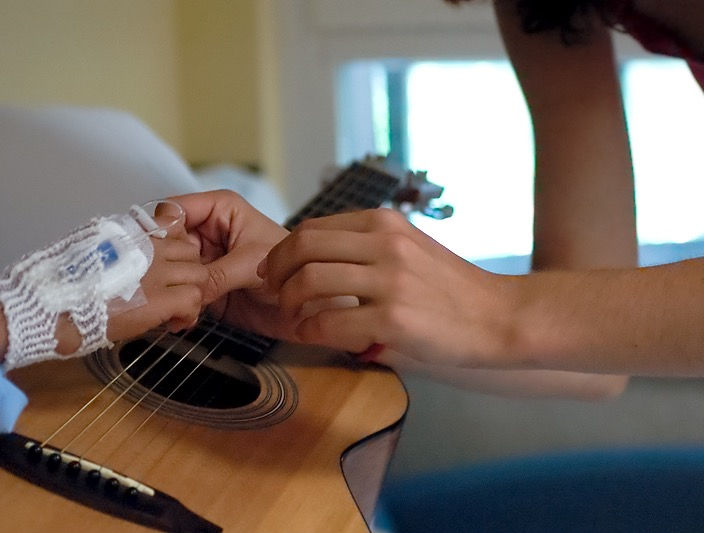Hospital Clinic Music Therapy
Music Therapy is an excellent hospital clinical tool, since it is capable of granting a large number of benefits to patients suffering from a chronic problem.
Different investigations have reported that music used as a therapeutic intervention in a medical context can have a beneficial effect on different clinical events, such as: pain (Siedliecki & Good, 2006), asthma (Sliwka et al., 2012) , in osteoarthritis treatments (Ottaviani et al., 2012), among others, since it has been observed that music produces physiological effects on blood pressure, heart and respiratory rate (Knight & Rickard, 2001). In the same way, the use of music has been introduced as a treatment modality in different pathologies of the central nervous system, among which we can mention: disturbed behavior caused by senile dementia (Sung & Chang, 2005), schizophrenic disorder ( Gold et al., 2005), Alzheimer's (Brotons & Marti, 2003), and in some neurological disorders, among these: Parkinson (Haneishi, 2001) and cerebral ischemia (Noda et al., 2004). Likewise, recent research also reports benefits in psychiatric conditions, such as anxiety and depression (Flores & Terán, 2015; Hanser & Thompson, 1994; Burns et al., 2002).
The Hospital Clinic Music Therapy service aims to promote, design, implement and evaluate different music therapy programs in hospitals and clinics in Mexico.
Our programs are aimed at the three sectors that we consider crucial in the hospital environment:
-
Patients (hospitalized or outpatient)
-
Relatives of patients
-
Hospital health personnel
If you have questions about our programs or if you want to implement a Hospital Clinic Music Therapy program in your institution, please contact us, we will gladly assist you.
-
Siedliecki, SL & Good, M. (2006). Effect of music on power, pain, depression and disability. J Adv Nurs., 54 (5): 553-562.
-
Sliwka, A., Nowobilski, R., Polczyk, R., Nizankowska-Mogilnicka, E. & Szczeklik, A. (2012). Mild asthmatics benefit from music therapy. The Journal of asthma., 49 (4): 401-408.
-
Ottaviani, S., Bernard, JL, Bardin, T. & Richette, P. (2012). Effect of music on anxiety and pain during joint lavage for knee osteoarthritis. Clinical Rheumatology., 31 (3): 531-534.
-
Knight, WE & Rickard, NS (2001). Relaxing music prevents stress-induced increases in subjective anxiety, systolic blood pressure, and heart rate in healthy males and females. J Music Ther Winter., 38 (4): 254-272.
-
Sung, HC & Chang, AM (2005). Use of preferred music to decrease agitated behaviors in older people with dementia: a review of the literature. J Clin Nurs., 14 (9): 1133-1140.
-
Gold, C., Heldal, TO, Dahle, T. & Wigram, T. (2005). Music therapy for schizophrenia or schizophrenia-like illnesses. Cochrane Database Syst Rev., 2: CD004025.
-
Brotons, M. & Marti, P. (2003). Music therapy with Alzheimer's patients and their family caregivers: a pilot project. J Music Ther., 40 (2): 138-150.
-
Haneishi, E. (2001). Effects of music therapy voice protocol on speech intelligibility, vocal acoustic measures, and mood of individuals with Parkinson's disease. J Music Ther., 38 (4): 273-290.
-
Noda, R., Maeda, Y. & Yoshino, A. (2004). Therapeutic time window for musicokinetic therapy in a persistent vegetative state after severe brain damage. Brain Inj., 18 (5): 509-515.
-
Flores- Gutiérrez, EO, & Terán-Camarena, VA (2015). Music Therapy in Generalized Anxiety Disorder. The Arts in Psychotherapy, 44, 19–24. http://doi.org/10.1016/j.aip.2015.02.003
-
Hanser, SB & Thompson, LW (1994). Effects of a music therapy strategy on depressed older adults. J Gerontol., 49 (6): 265-269.
-
Burns, JL, Labbé, E., Arke, B., Capeless, K., Cooksey, B., Steadman, A., Gonzales, C. & University of South Alabama. (2002). The Effects of Different Types of Music on Perceived and Physiological Measures of Stress. J Music Ther., 39 (2): 101-116.



